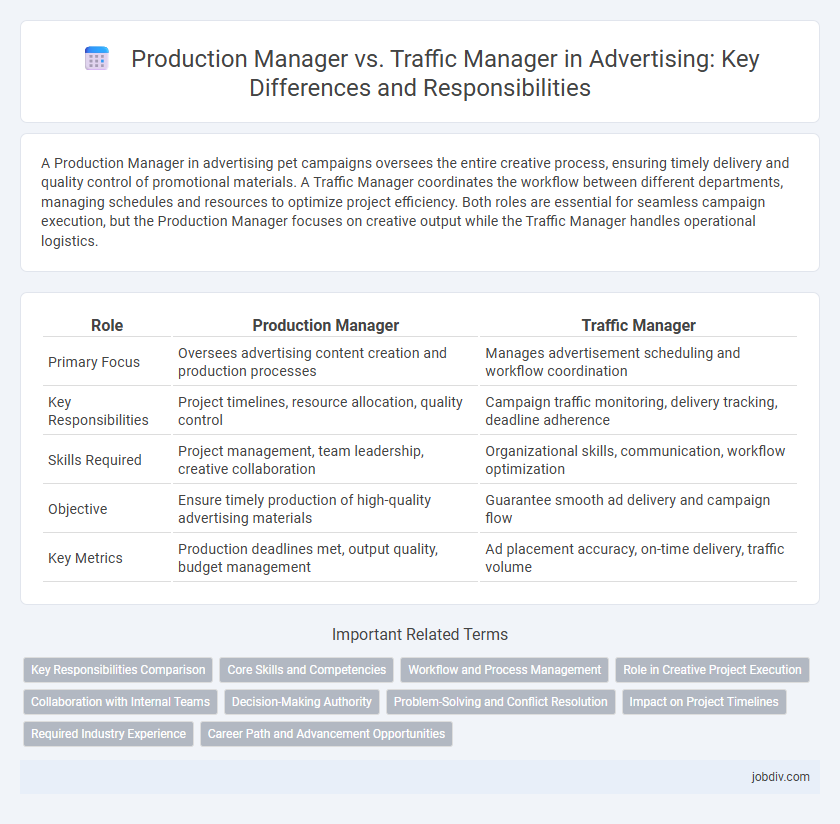A Production Manager in advertising pet campaigns oversees the entire creative process, ensuring timely delivery and quality control of promotional materials. A Traffic Manager coordinates the workflow between different departments, managing schedules and resources to optimize project efficiency. Both roles are essential for seamless campaign execution, but the Production Manager focuses on creative output while the Traffic Manager handles operational logistics.
Table of Comparison
| Role | Production Manager | Traffic Manager |
|---|---|---|
| Primary Focus | Oversees advertising content creation and production processes | Manages advertisement scheduling and workflow coordination |
| Key Responsibilities | Project timelines, resource allocation, quality control | Campaign traffic monitoring, delivery tracking, deadline adherence |
| Skills Required | Project management, team leadership, creative collaboration | Organizational skills, communication, workflow optimization |
| Objective | Ensure timely production of high-quality advertising materials | Guarantee smooth ad delivery and campaign flow |
| Key Metrics | Production deadlines met, output quality, budget management | Ad placement accuracy, on-time delivery, traffic volume |
Key Responsibilities Comparison
Production Managers oversee the entire advertising campaign lifecycle, coordinating creative development, budgeting, and timeline adherence to ensure seamless project execution. Traffic Managers specialize in workflow management, scheduling, and resource allocation to optimize the movement of projects through various production stages. Both roles collaborate closely to meet deadlines, but Production Managers focus more on strategic oversight while Traffic Managers emphasize operational efficiency.
Core Skills and Competencies
Production Managers excel in project coordination, budgeting, and resource allocation, ensuring advertising campaigns are delivered on time and within scope. Traffic Managers specialize in workflow management, scheduling tasks across departments to optimize efficiency and minimize bottlenecks in campaign execution. Both roles require strong communication, problem-solving abilities, and in-depth knowledge of advertising processes to successfully drive project completion.
Workflow and Process Management
A Production Manager in advertising oversees the end-to-end creation of campaigns, coordinating creative resources, timelines, and budgets to ensure deliverables meet client expectations. A Traffic Manager focuses on workflow optimization by managing the scheduling, routing, and prioritization of tasks across teams to maintain efficient progress throughout the project lifecycle. Both roles collaborate to streamline process management, reducing bottlenecks and ensuring timely project completion within agency operations.
Role in Creative Project Execution
A Production Manager oversees the entire lifecycle of creative projects, ensuring timely delivery, quality control, and resource allocation across teams. A Traffic Manager coordinates the workflow and communication between departments, optimizing schedules and managing deadlines to maintain project momentum. Together, they enhance efficiency and clarity in advertising campaigns, balancing strategic oversight with operational flow management.
Collaboration with Internal Teams
Production Managers coordinate closely with creative, design, and media teams to ensure timely execution of advertising campaigns, managing schedules and resources for seamless project delivery. Traffic Managers facilitate communication between account, production, and media departments, overseeing workflow to optimize task prioritization and deadline adherence. Their collaboration with internal teams enhances operational efficiency, reduces bottlenecks, and supports the successful launch of marketing initiatives.
Decision-Making Authority
A Production Manager holds higher decision-making authority in advertising, overseeing the entire creative process, resource allocation, and timelines to ensure project completion. In contrast, a Traffic Manager focuses on scheduling, workflow coordination, and ensuring smooth communication between departments without direct control over creative or production decisions. The Production Manager's broader strategic role impacts campaign success more significantly than the Traffic Manager's operational support.
Problem-Solving and Conflict Resolution
Production Managers excel in problem-solving by coordinating creative teams and resources to ensure timely project delivery, actively resolving issues like scheduling conflicts or technical challenges. Traffic Managers specialize in conflict resolution by managing workflow between departments, prioritizing tasks, and mitigating bottlenecks to maintain smooth campaign execution. Both roles require critical thinking and effective communication to address obstacles and maintain efficiency in advertising production.
Impact on Project Timelines
A Production Manager ensures efficient resource allocation and workflow coordination, directly influencing project completion speeds by managing schedules and budgets. A Traffic Manager oversees the movement of tasks and approvals across departments, minimizing bottlenecks and enhancing communication to keep deadlines on track. Both roles are critical in optimizing project timelines, with the Production Manager focusing on execution and the Traffic Manager on process flow.
Required Industry Experience
Production Managers in advertising typically require extensive industry experience in project management, creative processes, and vendor coordination to ensure smooth execution of campaigns. Traffic Managers need strong expertise in workflow optimization, scheduling, and cross-departmental communication within agency environments to maximize efficiency. Both roles benefit from a deep understanding of advertising timelines, resource allocation, and client requirements to drive successful project delivery.
Career Path and Advancement Opportunities
Production Managers in advertising oversee project timelines, resource allocation, and coordination between creative and technical teams, often progressing to executive roles like Operations Director. Traffic Managers specialize in workflow management, optimizing task scheduling and ensuring smooth communication across departments, with advancement opportunities leading to Traffic Director or Workflow Manager positions. Both career paths emphasize organizational skills but differ in focus, with Production Managers moving toward broader operational leadership while Traffic Managers hone process optimization expertise.
Production Manager vs Traffic Manager Infographic

 jobdiv.com
jobdiv.com